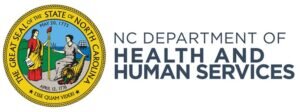
RALEIGH, N.C. — The North Carolina Department of Health and Human Services, Division of Public Health, Nutrition Services Branch announces its annual participation in the United States Department of Agriculture’s (USDA) Child and Adult Care Food Program (CACFP), ensuring children and adults continue to have access to good nutrition. NCDHHS is committed to providing nutritious food especially in response to the COVID-19 pandemic, and USDA flexibilities are in place to facilitate meeting participants’ needs during this challenging time.
CACFP is a federal program that provides reimbursements for nutritious meals and snacks to eligible children and adults who attend qualifying non-residential care facilities, such as child care centers, family child care homes and adult day care centers. The meals and snacks meet nutrition standards set by the USDA.
Most participating child care centers and all family child care homes do not have separate meal fees for enrolled participants. Reimbursement rates for meals served are based on the household incomes of those enrolled for care.
Each year, USDA’s Food and Nutrition Service (FNS) uses federal poverty information to update Income Eligibility Guidelines for CACFP. The guidelines determine an enrolled participant’s eligibility for free and reduced-price meals. The following guidelines are effective July 1, 2020 through June 30, 2021:
 |
Children who receive benefits through TANF, SNAP or Food Distribution Programs on Indian Reservations (FDPIR), or who are Head Start participants, homeless or migrants, are automatically eligible to receive free meal benefits. Adults who receive benefits through TANF, SNAP or FDPIR, or who participate in Supplemental Security Income (SSI) or Medicaid, are also automatically eligible for free meal benefits.
To learn more about how CACFP and how the program contributes to the wellness, healthy growth and development of young children and adults, visit the DPH Nutrition Services Branch website at www.nutritionnc.com/snp/meal-patterns.htm.
USDA Anti-Discrimination Policy
In accordance with Federal civil rights law and USDA civil rights regulations and policies, the USDA, its agencies, offices and employees, and institutions participating in or administering USDA programs are prohibited from discriminating based on race, color, national origin, sex, disability, age or reprisal or retaliation for prior civil rights activity in any program or activity conducted or funded by USDA.
People with disabilities who require alternative means of communication for program information (e.g. Braille, large print, audiotape, American Sign Language, etc.), should contact the Agency (State or local) where they applied for benefits. Individuals who are deaf, hard of hearing or have speech disabilities may contact USDA through the Federal Relay Service at (800) 877-8339. Additionally, program information may be made available in languages other than English.
USDA Complaint Information
To file a program complaint of discrimination, complete the USDA Program Discrimination Complaint Form, (AD-3027) found online at How to File a Complaint and at any USDA office. Complaints can also be submitted by letter, addressed to USDA, providing all of the information requested in the form. To request a copy of the complaint form, call (866) 632-9992. Submit completed forms or letters to USDA by:
Mail: U.S. Department of Agriculture
Office of the Assistant Secretary for Civil Rights
1400 Independence Avenue, SW
Washington, D.C. 20250-9410
Fax: (202) 690-7442
Email: program.intake@usda.gov
